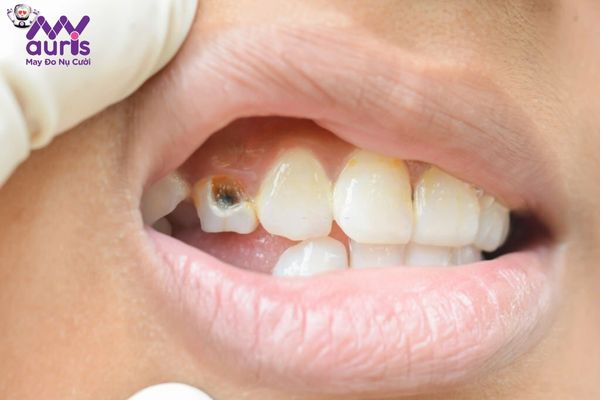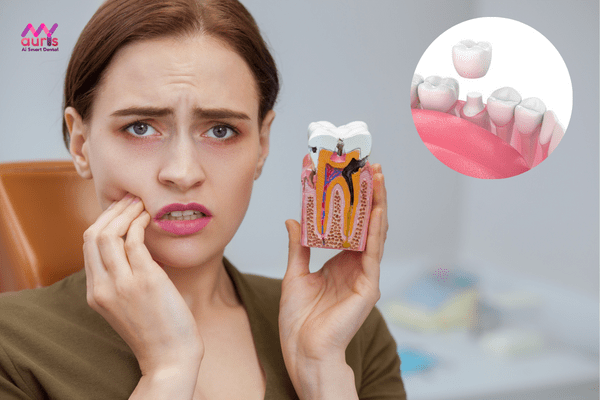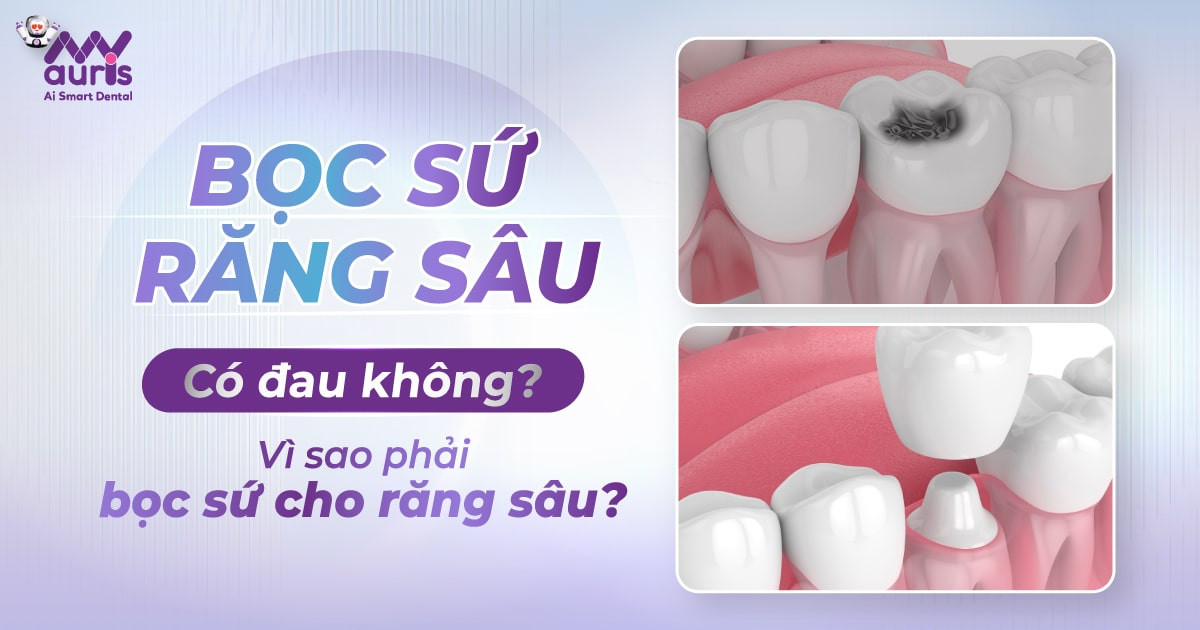Caries are teeth that carry disease. If not treated promptly, the bacteria continue to attack and spread to neighboring teeth. To preserve the original tooth as well as prevent bacteria, many people choose porcelain crowns. However, many people worry that porcelain crowns cause pain. So is porcelain crowns painful, or are porcelain crowns painful? Let’s answer with My Auris through the following article.
Answer: Are deep ceramic crowns painful?
The process of deep porcelain crowns uses anesthetics, so customers don’t have to worry too much. After the anesthetic wears off, depending on each person’s constitution, the pain will quickly subside and disappear after 2-3 days.
Tooth decay is a common oral disease that both adults and children suffer from. Tooth decay with tiny black holes on the teeth. If left untreated, these cavities become larger and larger, the bacteria destroy the dentin, attack the dental pulp, and even spread to neighboring teeth, causing severe infection.
In these cases, the doctor will advise customers to cover their teeth with porcelain to protect their real teeth as much as possible and prevent tooth decay from returning. Porcelain crowns are a simple solution, with quick recovery time and reasonable cost.
Before covering the tooth with porcelain, the doctor will treat the tooth for cavities and remove the pulp if bacteria have attacked the pulp. After thoroughly treating the disease, the doctor will perform porcelain crowns for cavities. Tooth grinding is one of the mandatory steps in the porcelain crown process. However, before grinding, the doctor will inject anesthetic so that the customer will not feel pain or discomfort during the tooth grinding process.
In addition, whether porcelain crowns are painful or not depends on the doctor’s skills, the conditions at the dental clinic, and the machinery and equipment. If the doctor is skilled and performs the correct technique of tooth grinding and porcelain coating, and has the support of modern machinery and equipment, the porcelain crown process will be gentle and achieve the desired results.
>

Why are there still cases of pain after porcelain crowns?
Although there is a lot of information that porcelain crowns do not cause pain, there are still cases of prolonged pain after porcelain restoration. So what is the cause?
- Not treating the disease thoroughly: Tooth decayFailure to treat, remove the infection, or not treat the root canal will increase the risk of more serious infection. From there, it causes lasting pain and discomfort. This can even cause real teeth to be lost forever.
- Poorly skilled doctor: Doctors grind teeth excessively and with incorrect techniques, invading the dentin, which will cause the teeth to weaken and cause lasting pain after porcelain crowns. In addition, the doctor does not take accurate tooth impressions or incorrectly fits the teeth, causing uneven porcelain teeth, causing pain when chewing. Not to mention, leaking or poor quality dental glue is also the cause of discomfort and pain for customers after porcelain crowns.
- Poor quality of porcelain tooth material, unknown origin, not guaranteed thermal conductivity also causes tooth sensitivity and pain after porcelain crowns.
- Weak tooth structure, sensitive teeth are also the causes of tooth pain after porcelain crowns.
- Diet and oral hygiene: After porcelain crowns, poor diet and hygiene also create conditions for bacteria to attack and continue to cause tooth decay, leading to pain and sensitivity. Porcelain teeth are strong but not flexible and elastic like real teeth. If you regularly eat hard foods, it can cause porcelain teeth to crack, from there, bacteria can penetrate the crack and cause tooth decay.

Therefore, to safely and successfully crown porcelain teeth, customers should choose a reputable dentist that ensures quality standards. In particular, it brings together a team of doctors with excellent expertise, skills, techniques and modern machinery and equipment, genuine porcelain tooth quality and ensuring maximum sterile conditions.
Why do we have to cover cavities with porcelain crowns?
Normally, people with cavities choose tooth fillings to prevent the cavities from spreading. However, dental fillings are only a temporary solution and do not completely stop the decay. Over time, the filling will peel off due to the force of chewing and oral hygiene. At this time, bacteria continue to attack and cause more severe tooth decay, even leading to permanent tooth loss.
Ceramic crowns for cavities are the perfect solution, ending the decay as well as providing better aesthetics and chewing ability than tooth fillings. Specifically as follows:
- High aesthetics: Porcelain teeth are crafted in shape and size according to individual tooth parameters and similar to real teeth. Therefore, when installing porcelain teeth,n will cover black spots on tooth pulp and ensure aesthetics.
- Ensures chewing: Porcelain teeth are fixed on the jaw like real teeth so chewing is still guaranteed as usual. However, depending on the quality of porcelain teeth, there are different hardness and flexibility. Depending on the type of porcelain teeth that customers choose, build and choose appropriate foods to prolong the life of their teeth.
- Prevent tooth decay from returning: Porcelain teeth act as a protective layer for real teeth. Porcelain teeth prevent adhesion and plaque accumulation, preventing bacteria from attacking. However, there are still some cases of tooth decay after porcelain crowns due to improper diet and hygiene, causing the porcelain teeth to crack and bacteria to attack the inside through the cracks. Or, the doctor does not fit the tooth tightly against the gums, creating a gap for bacteria and plaque to attack the real tooth pulp.

How to reduce pain after porcelain crowns
As mentioned, whether porcelain crowns are painful or not depends on each person’s constitution. However, in the first 1-2 days of grinding porcelain teeth, you will feel a bit uncomfortable and sore because your gums have not yet adapted. At that time, customers can apply some pain relief methods as follows:
- Cold compress after porcelain veneers: Low temperature helps reduce pain and discomfort quickly. Place the ice pack on the cheek with the painful tooth, not directly on the tooth.
- Hot compresses: After 2 days of porcelain treatment, hot compresses help soothe the wound, improve blood circulation, and reduce pain.
- Diet: In the beginning, the gums have not adapted, choose soft, liquid foods, limit chewing, and have a big impact on the teeth, causing more pain. At the same time, also limit foods high in sugar, too hot, too cold or stimulating like spicy. These foods make pain and discomfort worse.
- Proper oral hygiene and care: Brush teeth regularly twice a day in combination with using dental floss, water flosser, mouthwash or salt water to increase the ability to clean the oral cavity.

In addition, if the pain still persists, the best way is for the customer to return to the dentist for a doctor to check and find the cause.
Above is the information about whether porcelain crowns are painful or not, hoping to answer everyone’s questions. However, pain after porcelain crowns has many influencing factors. To understand better, please contact My Auris dentistry immediately for advice. Or contact us to schedule a visit as soon as possible.
Anh Thy





